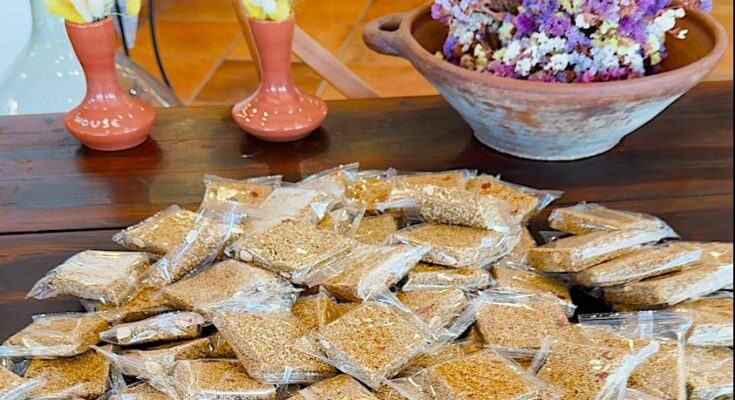The melekouni of Rhodes is the delicious traditional energy snack that connects Ancient Greece with modern day healthy diet habits.
Melekouni is a healthy sweet that stands out for its great taste and high nutritional value. Fragrant thyme honey produced from the islands of the Dodecanese, natural sesame, whole almonds, grated orange and bergamot peel with various spices added depending on the region, make up this recipe.
The snack got its name from the traditional Rhodian dialect. “Kouni” is used to refer to the sesame seed and “mele” is for honey.
The soft, sweet snack is cut in diamond shape, and releases all its aromas the moment you taste it. The secret of the recipe is in the love and joy of the moments that accompany the melekouni and the traditional way it is made. When eating a melekouni, one has a good, pleasant feeling, as if one is making oneself a gift – a gift full of the rich nutrients of honey and sesame without the burden of unnecessary calories.

A tradition as rich as the taste
Melekouni is the traditional, healthy snack that all Rhodians love. It is offered everywhere and always, on holidays, at weddings, christenings, at all social events. The women of the village gather to make the melekounia (plural) in a festive atmosphere with singing and joy. This is also the secret of the recipe. It is the sweet of friendship, happiness and good fortune.
When melekouni is offered in weddings, it is accompanied by the wish: “May the couple live as many years as the number of sesame seeds in each piece.”
The recipe varies from village to village, but its taste remains wonderful and sesame-like. Its texture is flexible and soft, and its color is golden yellow. Although it looks like a common pasteli It differs in terms of its ingredients and the way it is prepared. Unlike pasteli that is hard and has little honey, melekouni is soft and flexible because it contains much more honey.
The sweet energy snack is produced in the traditional way in local workshops or homes and from there it is supplied to local food stores, as well as throughout Greece, not only as a sweet but also as a nutritious snack.

Melekouni in Ancient Greece
The history of the Rhodian energy snack is traced back in antiquity and is known since Homeric times. Pasteli is mentioned by Homer in the Iliad under the name “indrion”, which meant placenta with honey and sesame, a food the Greeks ate to be able to withstand the hardships of war.
Honey and sesame had a very important place in the diet of the ancient Greeks. They knew their high nutritional value and many centuries later science proved it. Sesame is a symbol of fertility and the first historian to mention pasteli is Herodotus.
Its preparation process remains unchanged for hundreds of years. Fragrant honey, toasted sesame, toasted almonds, spices and citrus zest are its main ingredients. In the islands of the Dodecanese, excellent quality honey is produced in different varieties such as flower, pine, conifer, thyme, etc.” Thyme and flower honey stand out for their excellent quality, wonderful aroma and unique taste. They are the types of honey chosen for the preparation of melekouni.
Honey is a natural product that does not undergo any processing and consists of water, natural sugars, organic acids, proteins, trace elements, enzymes, minerals, vitamins, microorganisms, flavonoids, alkaloids, pollen grains, aromatic and coloring substances. Sesame seeds are produced in the region and their nutritional value is high, mainly due to the quality of their proteins and the monounsaturated fats of their oil.
The almond is one of the favorite nuts with a wonderful buttery taste and high nutritional value. Citrus fruits (juice and zest) and spices (cinnamon) give a special taste, smell and abundance of nutrients to melekouni.
The traditional energy snack contributes to well-being and longevity. It is characterized by antioxidant, antiaging, antimicrobial, antibacterial, antihypertensive, antithrombotic and hypocholesterolemic effects. It has osteoprotective properties. It prevents atherosclerosis, cancer, degenerative diseases (rheumatoid arthritis, multiple sclerosis, osteoarthritis, Alzheimer’s disease, Parkinson’s disease) and diseases of the digestive system.
As a precious heritage food, the melekouni is included in the Greek breakfast of Rhodes. It is a “customary practice linked to the eating habits of the Rhodians and the propagation of the tradition”. As the ambassador of Rhodes to the rest of Greece, it has already been recognized as a Product of Protected Geographical Indication (PGI) and has been included in the national index of Intangible Cultural Heritage of Greece. As a food product in the modern era, it can connect the traditional Rhodes gastronomy with new nutritional trends.



